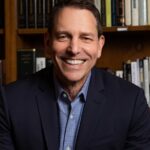EPISODE 197: “How We Can Rein in the Power of the Federal Government” with Mark Meckler.
The genius of the founders who gave us the United States Constitution was that they sought to provide a system of government to guard against the concentration of power by an elite few. Their clear-eyed understanding of human nature was that unchecked power almost always and everywhere has been the source of tyranny throughout history. But for more than a century in America, the Constitution, as drafted and ratified, has been either ignored or, creatively lawyered by Supreme Court rulings, to expand federal power. Washington DC today enjoys almost unchecked power. This is a systemic problem that requires a systemic solution. So says Mark Meckler, my guest on this episode. Mark is founder of the Convention of the States, which calls for using Article V of the Constitution to call a Convention of States to propose amendments. “This is about more than elections. Elections cannot and will not solve the problems of a broken system. The only solution big enough to fix our nation’s problems is a Convention of States for proposing constitutional amendments to rein in federal tyranny.” The Convention of States would only allow the states to discuss amendments that, “limit the power and jurisdiction of the federal government, impose fiscal restraints, and place term limits on federal officials.”
Here are some of the types of amendments that could be proposed:
• Limiting Supreme Court Justices to nine members of the court
• Preventing the federal government from adding states without the affirmative consent of three quarters of the existing states
• A limitation on using Executive Orders and federal regulations to enact laws
• A balanced budget amendment, including limitations on taxes and spending
• Imposition of Generally Accepted Accounting Principles (GAAP) • Single Subject Amendment – One subject per bill in Congress
• A redefinition of the General Welfare Clause back to original intent (the original view was the federal government could not spend money on any topic within the jurisdiction of the states)
• A redefinition of the Commerce Clause back to original intent (the original view was that Congress was granted a narrow and exclusive power to regulate shipments across state lines–not all the economic activity of the nation)
• A prohibition of using international treaties and law to govern the domestic law of the United States
• Placing an upper limit on federal taxation
• Requiring the sunset of all existing federal taxes and a super-majority vote to replace them with new, fairer taxes
• Religious freedom amendment, prohibiting the government from further interference with our religious freedoms
• Regulatory curtailment by forcing Congress to vote on regulations instead of deferring law making to regulators.
Is any of this possible?
Nineteen states have already voted to call for a Convention. Thirty four are need needed to make it happen.
Listen in to learn how Mark believes we can bring this about.
SUBSCRIBE TODAY
FEATURED GUESTS
Related
Episodes

Episode 291: The Ministry of Green Truth: Mark Mills Exposes America’s $6 Trillion Energy Fantasy

Episode 290: Fifth Generation Warfare: Where Hypersonic Missiles Meet the Healthcare State
What if modern warfare has evolved beyond anything history’s great strategists could have imagined? While Metternich orchestrated the balance of power through diplomatic summits and Machiavelli counseled princes on maintaining state authority, today’s battles for sovereignty unfold in unlikely places: doctors’ offices, veterinary clinics, and local zoning boards across America.
Watch Now
Episode 289: The Bird and the (Babylon) Bee

Episode 288: The Secret Game: A Fast Break to Freedom


